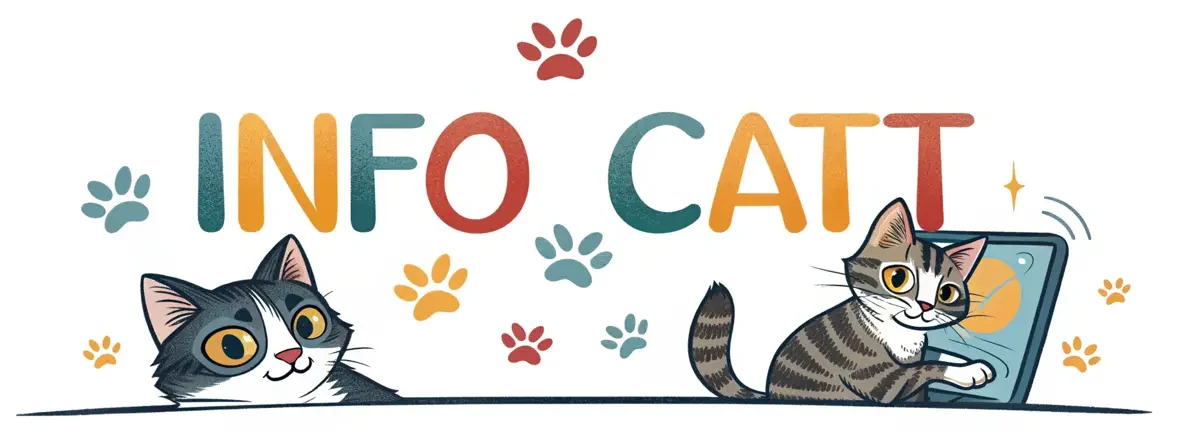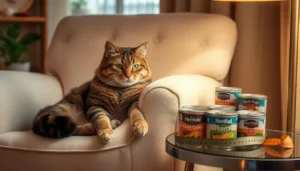Every cat owner has felt the pain of seeing their pet too thin. I remember Luna, my rescue cat, when she first came home. Her thin frame told a story of hard times.
Watching Luna grow from skinny to healthy was my goal. I wanted to learn how to make your cat gain weight safely.
Healthy weight gain for cats is more than just feeding them more. It’s about finding the right balance of nutrition and care. Whether your cat is picky or recovering from illness, gaining weight needs patience and smart plans.
This guide will help you understand how to help your underweight cat. We’ll cover everything from finding the cause of weight loss to using expert nutrition strategies. We’ll explore ways to support your cat’s health journey.
Understanding Why Your Cat Is Underweight: Signs and Causes
Discovering your cat is underweight can be concerning for any pet owner. It’s important to find out why your cat is losing weight. This knowledge helps you give your cat the best care and get them back to health.
Cats can become skinny for many reasons. Knowing why your cat is skinny helps you take the right steps to help them.
Common Medical Conditions Leading to Weight Loss
Several health issues can cause unexpected weight loss in cats:
- Hyperthyroidism disrupts metabolism and increases appetite
- Diabetes affects nutrient absorption
- Parasitic infections drain essential nutrients
- Dental problems make eating painful
- Kidney disease impacts overall nutrition
Behavioral Factors Affecting Cat’s Weight
Beyond medical conditions, what to feed a skinny cat depends on understanding potential behavioral triggers:
- Stress from environmental changes
- Competition with other pets for food
- Depression or anxiety
- Decreased appetite due to aging
When to Consult a Veterinarian
Not all weight loss is normal. Watch for these warning signs that indicate professional intervention is necessary:
- Sudden or dramatic weight loss
- Visible ribs or spine
- Lack of appetite for more than 24 hours
- Significant changes in drinking or bathroom habits
Professional veterinary guidance is crucial in determining the root cause of your cat’s weight issues and developing a targeted nutrition plan.
How to Make Your Cat Gain Weight : Essential Steps and Strategies
Helping an underweight cat regain health needs a careful plan. Start by understanding their nutritional needs. Then, create a diet plan for them.
While helping your cat gain weight, you may notice increased affection like licking — find out what it really means when your cat licks you.
First, check your cat’s current health. To boost their appetite, try these steps:
- Offer smaller, more frequent meals throughout the day
- Warm food slightly to enhance its aroma and appeal
- Use cat appetite stimulants recommended by your veterinarian
- Experiment with different food textures and flavors
Choosing the right food is key. High-calorie wet foods are often best for underweight cats. Protein-rich diets help build muscle and improve body condition. Talk to your vet about supplements for weight gain.
Make eating stress-free for your cat. Place food bowls in quiet spots, away from noise. Some cats like elevated feeding stations for a better meal experience.
Patience is key when helping your cat regain weight. Gradual, consistent changes yield the best results.
Keep a close eye on your cat’s progress. Regular weigh-ins and vet visits are important. They help you see how well your plan is working and make any needed changes.
Best High-Calorie Foods and Supplements for Weight Gain
When your cat needs to gain weight, picking the right foods is key. It’s important to choose high-calorie foods carefully. This ensures your cat gets the nutrients they need.
Understanding your cat’s nutritional needs is crucial. Your vet can offer personalized advice. But, there are some general tips to help.
Premium Commercial Cat Foods for Weight Gain
Look for commercial cat foods made for weight gain. They should have:
- High protein content (35-45% protein)
- Rich in healthy fats
- Calorie-dense formulations
- Nutrient-rich ingredients
Natural Food Options to Fatten Up Your Cat
Wondering what to feed your cat to gain weight fast? Try these natural options:
- Boiled chicken – lean protein source
- Canned fish like sardines
- Egg yolks (cooked)
- Kitten milk replacer
Safe Supplements and Appetite Stimulants
Some cats need extra help to gain weight. Safe supplements can offer the extra nutrition they need. Always check with your vet before adding new supplements.
Pro tip: Gradually introduce new foods to prevent digestive upset and monitor your cat’s response carefully.
Creating an Effective Feeding Schedule and Environment
Helping an underweight senior cat or rescue cat gain weight is more than just picking the right food. Your feeding plan is key to their healthy weight gain.
Setting up a structured feeding area can boost your cat’s nutrition. Start with regular meal times that match your cat’s natural habits. Cats often do better with small, frequent meals all day.
- Set up 3-4 small meals daily
- Keep food and water bowls in a quiet, stress-free area
- Use shallow, wide dishes to prevent whisker fatigue
- Warm food slightly to enhance aroma and appeal
For rescue cats or seniors, free-feeding might be the best choice. It lets your cat eat when they’re hungry, helping them gain weight.
“Patience and consistency are key when helping your cat reach a healthy weight.” – Veterinary Nutrition Experts
When picking food for an underweight senior cat, choose high-calorie, nutrient-rich options. Wet foods are often better because they’re tastier and easier to digest.
Every cat is different. Watch how your cat eats and tweak your plan as needed. A calm, comfy feeding area can greatly improve your cat’s mealtime experience.
Monitoring Progress and Adjusting Your Weight Gain Plan
Watching your cat gain weight needs patience and careful watching. Home remedies work best when you keep an eye on your pet’s progress. Knowing how long it takes for a cat to gain weight helps set realistic goals and a good nutrition plan.
- Use a digital scale to track weight weekly
- Take body condition score measurements
- Document physical and behavioral changes
- Maintain a consistent feeding routine
Tracking Weight Changes
Regular weigh-ins are key to tracking your cat’s progress. Get a good pet scale and weigh your cat at the same time each week. Gradual weight gain is healthier than rapid fluctuations.
Signs of Healthy Weight Gain
Look for signs that your cat is gaining weight safely:
- Increased muscle mass
- More energy and playfulness
- Improved coat condition
- Normalized appetite
When to Modify Your Approach
If your cat isn’t gaining weight with current remedies, see your vet. You might need to change your cat’s diet. Some cats need special diets or medical help to gain weight healthily.
Remember: Every cat is unique, and weight gain timelines can vary significantly.
Conclusion
Getting your cat to a healthy weight takes time, effort, and a careful plan. Understanding what your cat needs to eat is key to their health. Remember, every cat is different, so their weight gain plan should be too.
It’s important to work with your vet on this journey. They can help spot any health problems and create a diet plan just for your cat. With the right steps, your cat can get stronger, look better, and live a happier life.
Stick to your feeding plan and watch your cat’s progress closely. Regular weigh-ins, checking their appetite, and noticing any changes are crucial. Your love and knowledge are the best things you can offer your cat as they gain weight.
Your hard work in feeding and caring for your cat will pay off. Be patient, stay informed, and trust the steps you’re taking. This will help your cat live a better life.
FAQ
How quickly can I expect my cat to gain weight?
Weight gain in cats depends on their health and metabolism. You might see improvements in 4-8 weeks with the right nutrition plan. Remember, every cat is different, so be patient. Aim for 1-2 ounces of weight gain per week for most cats.
What are the most common reasons my cat might be underweight?
Cats can lose weight due to health issues like hyperthyroidism or diabetes. Parasites, dental problems, or digestive issues also play a role. Stress, environmental changes, or competition with pets can affect weight too. Age and poor appetite can also contribute to weight loss.
Are there specific high-calorie foods that can help my cat gain weight?
Yes! Choose high-calorie cat foods with more protein and fat. Wet foods, kitten formulas, and weight gain foods are good options. You can also add kitten milk replacer, canned tuna, cooked chicken, and vet-approved supplements. Always check with your vet before changing your cat’s diet.
How can I stimulate my cat’s appetite?
Warm the food slightly to make it smell better. Offer smaller meals more often. Use vet-prescribed appetite stimulants if needed. Try different food textures and temperatures. Some cats like wet food or food toppers. Make sure they feel comfortable while eating.
Is it safe to use home remedies to help my cat gain weight?
Some home remedies are safe, but always check with your vet first. Safe options include olive oil, goat’s milk, or high-protein treats. But, never replace vet advice or a tailored nutrition plan with these.
What signs indicate my cat is at a healthy weight?
A healthy cat has a body condition score where you can feel their ribs. They should have a visible waist and an abdominal tuck. They should be energetic, have a shiny coat, and no visible bones. Regular vet visits help assess their weight and health.
Are there special considerations for senior cats trying to gain weight?
Senior cats need special nutrition with easy-to-digest proteins and added nutrients. They might need softer foods, smaller portions, and more meals. Look for senior cat foods with higher calories and omega-3 fatty acids. Always watch for health issues that could affect weight gain.
Can stress prevent my cat from gaining weight?
Yes! Stress can lower a cat’s appetite and metabolism. Changes, new pets, loud noises, or disrupted routines can cause stress. Create a calm eating area, keep routines consistent, and use calming aids. Make sure your cat feels safe and secure during meals.


